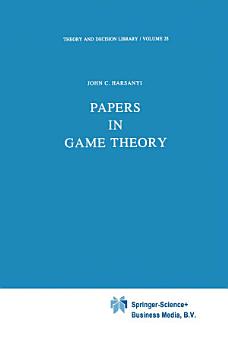Papers in Game Theory
J.C. Harsanyi
মাৰ্চ ২০১৩ · Theory and Decision Library কিতাপ 28 · Springer Science & Business Media
৪.০star
২ টা পৰ্যালোচনাreport
ইবুক
260
পৃষ্ঠা
reportমূল্যাংকন আৰু পৰ্যালোচনা সত্যাপন কৰা হোৱা নাই অধিক জানক
এই ইবুকখনৰ বিষয়ে
This volume contains twelve of my game-theoretical papers, published in the period of 1956-80. It complements my Essays on Ethics, Social Behavior, and Scientific Explanation, Reidel, 1976, and my Rational Behavior and Bargaining Equilibrium in Games and Social Situations, Cambridge University Press, 1977. These twelve papers deal with a wide range of game-theoretical problems. But there is a common intellectual thread going though all of them: they are all parts of an attempt to generalize and combine various game-theoretical solution concepts into a unified solution theory yielding one-point solutions for both cooperative and noncooperative games, and covering even such 'non-classical' games as games with incomplete information. SECTION A The first three papers deal with bargaining models. The first one discusses Nash's two-person bargaining solution and shows its equivalence with Zeuthen's bargaining theory. The second considers the rationality postulates underlying the Nash-Zeuthen theory and defends it against Schelling's objections. The third extends the Shapley value to games without transferable utility and proposes a solution concept that is at the same time a generaliza tion of the Shapley value and of the Nash bargaining solution.
মূল্যাংকন আৰু পৰ্যালোচনাসমূহ
৪.০
২ টা পৰ্যালোচনা
এই ইবুকখনক মূল্যাংকন কৰক
আমাক আপোনাৰ মতামত জনাওক।
পঢ়াৰ নির্দেশাৱলী
স্মাৰ্টফ’ন আৰু টেবলেট
Android আৰু iPad/iPhoneৰ বাবে Google Play Books এপটো ইনষ্টল কৰক। ই স্বয়ংক্রিয়ভাৱে আপোনাৰ একাউণ্টৰ সৈতে ছিংক হয় আৰু আপুনি য'তে নাথাকক ত'তেই কোনো অডিঅ'বুক অনলাইন বা অফলাইনত শুনিবলৈ সুবিধা দিয়ে।
লেপটপ আৰু কম্পিউটাৰ
আপুনি কম্পিউটাৰৰ ৱেব ব্রাউজাৰ ব্যৱহাৰ কৰি Google Playত কিনা অডিঅ'বুকসমূহ শুনিব পাৰে।
ই-ৰীডাৰ আৰু অন্য ডিভাইচ
Kobo eReadersৰ দৰে ই-চিয়াঁহীৰ ডিভাইচসমূহত পঢ়িবলৈ, আপুনি এটা ফাইল ডাউনল’ড কৰি সেইটো আপোনাৰ ডিভাইচলৈ স্থানান্তৰণ কৰিব লাগিব। সমৰ্থিত ই-ৰিডাৰলৈ ফাইলটো কেনেকৈ স্থানান্তৰ কৰিব জানিবলৈ সহায় কেন্দ্ৰত থকা সবিশেষ নিৰ্দেশাৱলী চাওক।









